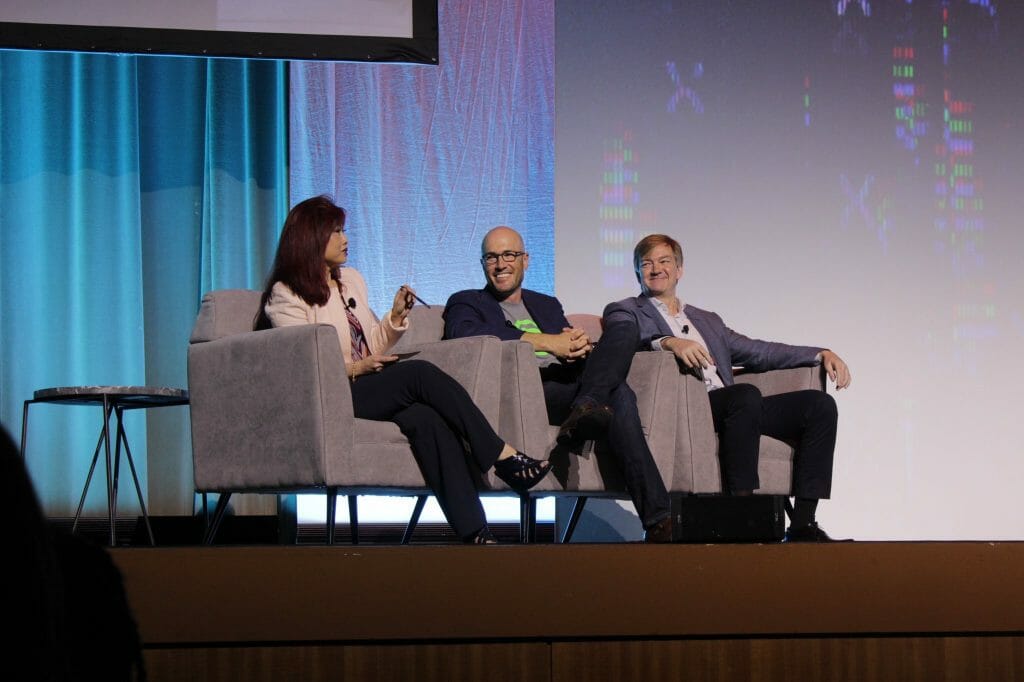On April 30, ParkMobile CMO, Jeff Perkins, hit the stage alongside Dr. Jeff Schneider, Founding Member of Uber’s Advanced Technologies Group, Alexander Ernst, CFO of Lab1886, and Mike Coffas, Southeast Lead of Waze, for a panel discussion surrounding the future of transportation.

Jacqui Chew of TedXAtlanta moderated the panel, opening with a question to the audience:
How long did it take you to get here?
Some raised their hands for over an hour and a half, some for an hour, and some for thirty minutes, to which Chew responded, “That’s pretty good.” On average, Atlanta drivers will spend 484 days in their cars commuting to and from work over the course of their lives.
Currently, 50% of the world’s population lives in cities. In 20-30 years, this number is expected to rise to two-thirds of the world’s population. And while this oncoming urbanization will facilitate social integration, it’s created major concerns around mobility, traffic, and air quality for future inhabitants that leaders in innovation are looking to solve in advance.
How Far Are We from Level 4?
According to the Brookings Institution, nearly $80 billion was invested in transportation-related innovation, specifically in the realm of autonomous cars, between 2014 and 2017. While the time it will take for the technology to adapt enough to be widely deployed is debated, there is consensus that this time will come in years rather than decades. As we discuss the path to autonomy, six levels are used to classify a system’s sophistication. At Level 4, a system is highly automated, meaning a car operates without human input or oversight under select conditions.
According to Schneider of Uber, our proximity to Level 4 depends on when companies decide to “start on that ramp,” which he believes will be in the next couple of years. Perkins of ParkMobile raises the question of user adoption. While Level 4 technology might be ready, consumer trust will need be grounded before it can really take off.
Perkins shares his own experience with Aptiv’s self-driving vehicles in Las Vegas, remarking that the experience can be a bit alarming for first-timers – even with two moderators in the front of the car. However, Schneider assures that the option for customers to take a selfie during their ride has the ability to quickly distract them as soon as they get into the vehicle, formulating a level of trust with the experience that proves user adoption might not be as difficult as we think.
What It Means for Parking and Transportation
“The future is not about people driving cars. It’s about cars driving people,” says Perkins of ParkMobile. So, what do cars do when they’re not driving people? Cities will not tolerate empty cars cruising the block, so there will still be a place for parking. Autonomous cars will need to park and get serviced on their own, whether that service be a car cleaning, an oil change, or an EV charge – and these vehicles will need to operate between these efficiencies without the need for human command.
With the rise of autonomous vehicles, consumers will be less interested in car ownership and more interested in enhancing the in-car experience. A consumer’s experience with transportation will eventually involve purchasing the mileage required to complete a trip and any desired in-car services on-demand. “As transportation culture evolves, the novelty of autonomous cars will eventually die out, and the focus will come back to how to get places quickly,” says Coffas of Waze.
Reinventing the Consumer Commute
What will the consumer commute look like in 10 years?
Ernst of Lab1886 believes the consumer commute of the future will be a “seamless flow of autonomous cars.” Any time consumers need to get from point A to point B, they will have options to choose from, and these options will be wired to get them to their destinations in the most efficient manner. Navigation will be smarter, and the communication between vehicles will be designed so that we’re dissolving the concept of wait time.
“Once there is an entire population with no car, there will be a complete reinvention of all transit systems,” says Schneider of Uber. Perkins of ParkMobile believes there will eventually be an app that allows consumers to design the most efficient, customized commute to wherever they need to go. “Cities are so congested now, and it really takes all consumer solutions – whether that be a scooter, a bike, a car, or public transit – to enable full-force mobility,” he says. “All of these segments are becoming a part of the consumer journey every day,” says Coffas of Waze.
Giving Time Back to Consumers
“Mobility will be the market of the future,” says Ernst of Lab1886. “And as the technology improves, we’re looking for opportunities to give time back to consumers.”
So, what do consumers get to use this time for?
Coffas of Waze believes that as the technology gets tighter for autonomous vehicles, the consumer journey will become more productive. We currently spend so much time in our cars driving, but once the cars are driving us, the car can become an area of production. Whether the car becomes a space for consumers to convene for a business meeting or a space to enjoy a relaxing in-car dining experience, consumers are getting their time back – the most sacred aspect of their productivity.
You can watch the full video of the panel discussion here.

 Get it on Google Play
Get it on Google Play